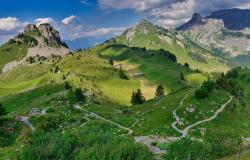
Themes absent from the current debate around the next legislative elections. This does not prevent researchers from working to better understand these developments and try to find solutions to limit their consequences.
Interview with Stéphane Abadie, physics researcher, specialized in marine engineering, deputy director of ISA BTP and the Siame laboratory (Laboratory of engineering sciences applied to mechanics and electrical engineering).
Why these National Coastal Engineering Days at ISA BTP?
These days have been organized every two years since 1990 by the French Coastal Center. An independent association which deals with the coast in the broad sense. Each time it relies on a local structure, such as here the UPPA (University of Pau and the Pays de l’Adour) and the ISA BTP, to put them in place.
How was the ISA BTP site chosen to organize them?
It is a form of recognition. The Siame laboratory, housed at ISA BTP, is recognized nationally and internationally for its work. Within it, the coastal engineering team is made up of four teacher-researchers and around ten doctoral students. We work on wave/structure interactions. In particular, we study the impacts that storms can have on infrastructure. Very few teams at national level work on these subjects. We are interested in everything related to the impact of waves on structures.
Who are the speakers during these days?
All national structures interested in these subjects are present. The universities which work in these fields, the research centers such as the BRGM (Bureau of Geological and Mining Research), Ifremer, EDF, which historically is concerned with all its seaside power stations, the CEA (Atomic Energy Commission ) for tsunamis, etc. All the questions that are in the themes of the conferences resonate on the territory of the Basque Coast.
What are the priority topics?
There are several essential topics. Particularly what concerns energy, but also coastal risks, often linked to global warming. This is of course a social issue. In France, we have challenges due to the numerous constructions close to the sea. On a global level, for populations who live near the coasts, this is a huge upheaval. Faced with the effects of global warming, we must equip ourselves with methods and tools that will allow us to manage these risks. In terms of protection, forecasting, knowledge of climate change. We are witnessing rapid developments. We see it in the Basque Country, with the Corniche road. But in some places in the world, entire populations are directly affected.
Regarding energy, which ocean-related solutions seem most viable?
Currently, offshore wind power is mature. We had a special reading, as part of these national days, on the calculation of extreme forces in storms on off-shore wind turbines. On the Basque Coast, this method of electricity production is not envisaged. There is not enough wind. This is why the Nouvelle-Aquitaine Region and the Basque Country Urban Community have turned to wave energy. But this is not yet a successful mode of production. There are currently too many different technologies.
How do you approach questions related to the retreat of the coastline?





